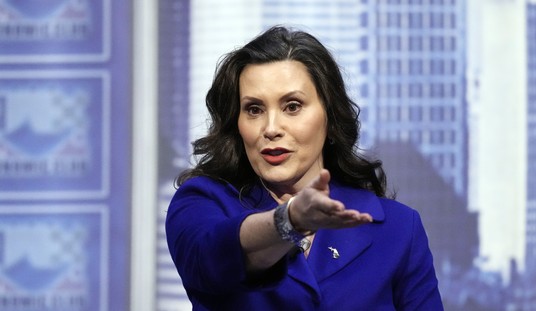
Public domain image via ODNI Facebook
This morning, the White House released the transcript of President Trump’s call with Ukraine President Zelensky. If you were expecting this to be a dud, you were wrong. It didn’t even rise to the level of a dud (read my post). Now a second document has been released. This deals with the reason that the acting DNI and the Attorney General have ruled that the so-called “whistleblower” complaint would not be released to the House or Senate Intelligence Committee. By way of background, I’m going to rely on a post on The Bulwark. Because I don’t give links to hate sites or fake news sites because I don’t want to encourage them, I’ll just say this is by a guy named Philip Rotner and he didn’t appear to have been shooting blood out of his whatever in raging delirium of TDS as he was writing it.
In the current case, an unnamed employee of the intelligence community submitted a whistleblower disclosure to the inspector general, Michael Atkinson, on August 12.
Atkinson determined that the report was both credible and involved a matter of urgent concern. Accordingly, as required by the act, he transmitted it to the acting DNI Joseph Maguire on August 26, just prior to the expiration of the 14-day reporting period.
Up to this point, everything had played out exactly as required by the Whistleblower Act.
But then it went off the rails.
Rather than transmitting the IG report to the congressional intelligence committees, as required by the act, DNI Maguire blew through the mandatory 7-day reporting period without so much as a peep. He not only failed to tell Congress what the whistleblower had reported, but he failed even to inform Congress of the existence of such a report until September 9, a week after the expiration of the 7-day reporting period.
The DNI now claims that he has refused to transmit the whistleblower report to Congress because it concerns “conduct by someone outside the Intelligence Community and because the complaint involves confidential and potentially privileged communications.”
But the DNI doesn’t say who made this determination. Did he reach that decision on his own, even though the statute gives the responsibility for making that decision to the IG, not the DNI? Or is he refusing to comply with the statute because the attorney general has advised him to do so? (If you go by the letter of the law, the attorney general has no role in this statutory scheme.) Or is there another party who is involved in making this extra-statutory decision?
If you go by the letter of the law, the only possible legal justification for the DNI’s failure to comply with the act, would be that the president himself had ordered his action. Remember: Neither the DNI nor the attorney general has any discretion under the act, which says that the DNI “shall” transmit the report to Congress. No exceptions. No discretion. And the Attorney General has no statutory role at all.
As it happens, the president does not have any discretion under the text of the act, either. But there’s a longstanding argument that a president has such a degree of constitutional authority over the executive branch that he can overrule decisions made by anybody within that branch.
This argument is not a matter of settled law so much as a theory about the extent of executive power. It has never been either fully accepted, or refuted, by the courts.
So if it was indeed President Trump who ordered the DNI to violate the act by not giving Congress the IG report, then a resolution of this conflict will eventually boil down to yet another clash over separation of powers between the president and Congress. And while the courts could theoretically resolve that dispute, getting a decision out of the Supreme Court could take months. Or years. And as if this whole mess weren’t already complicated enough, there is a highly ambiguous provision in the act that could be read (or misread, depending on your view) to immunize the whole affair from judicial scrutiny.
Along the way, we’ve also been told that the complaint covers several issues and not merely the telephone call.
The whistleblower complaint reportedly involving a discussion between President Trump and a foreign leader was based on more than one incident, said a Democratic lawmaker who attended the House Intelligence Committee’s closed-door meeting Thursday with the intelligence community’s inspector general.
Lawmakers said the inspector general, Michael Atkinson, declined to share incidents during the meeting.
“He didn’t talk about anything about the allegations, where he was very protective,” said Intelligence Rep. Mike Quigley (D-Ill.). “But he did mention that this complaint was based on a series of events, ‘more than one’ to get the exact wordage right.”
Now the mystery is largely solved. The Office of Legal Counsel opinion on why the complaint has not been turned over to Congress has been released and the reason is pretty simple. It simply isn’t what the IC IG made it out to be.
On August 26, 2019, the Inspector General of the Intelligence Community (“ICIG”) forwarded to the Acting Director of National Intelligence (“DNI”) a complaint from an employee within the intelligence community.* The complainant alleged that unnamed “White House officials” had expressed concern about the content of a telephone call between the President and a foreign leader. According to the ICIG, statements made by the President during the call could be viewed as soliciting a foreign campaign contribution in violation of the campaign-finance laws. In the ICIG’s view, the complaint addresses an “urgent concern” for purposes of triggering statutory procedures that require expedited reporting of agency misconduct to the congressional intelligence committees. Under the applicable statute, if the ICIG transmits such a complaint to the DNI, the DNI has seven days to forward it to the intelligence committees. See 50 U.S.C. § 3033(k)(5)(C).
The complaint does not arise in connection with the operation of any U.S. government intelligence activity, and the alleged misconduct does not involve any member of the intelligence community. Rather, the complaint arises out of a confidential diplomatic communication between the President and a foreign leader that the intelligence-community complainant received secondhand. The question is whether such a complaint falls within the statutory definition of “urgent concern” that the law requires the DNI to forward to the intelligence committees. We conclude that it does not. The alleged misconduct is not an “urgent concern” within the meaning of the statute because it does not concern “the funding, administration, or operation of an intelligence activity” under the authority of the DNI. Id. § 3033(k)(5)(G)(i). That phrase includes matters relating to intelligence activities subject to the DNI’s supervision, but it does not include allegations of wrongdoing arising outside of any intelligence activity or outside the intelligence community itself.
Our conclusion that the “urgent concern” requirement is inapplicable does not mean that the DNI or the ICIG must leave such allegations unaddressed. To the contrary, the ICIG statute, 50 U.S.C. § 3033(k)(6), makes clear that the ICIG remains subject to 28 U.S.C. § 535, which broadly requires reporting to the Attorney General of “[a]ny information, allegation, matter, or complaint witnessed, discovered, or received in a department or agency . . . relating to violations of Federal criminal law involving Government officers and employees.” 28 U.S.C. § 535(b). Accordingly, should the DNI or the ICIG receive a credible complaint of alleged criminal conduct that does not involve an “urgent concern,” the appropriate action is to refer the matter to the Department of Justice, rather than to report to the intelligence committees under section 3033(k)(5). Consistent with 28 U.S.C. § 535, the ICIG’s letter and the attached complaint have been referred to the Criminal Division of the Department of Justice for appropriate review.
In essence this is what you have. Some Resistance goober hears from someone who may have heard from someone that President Trump said something on the phone call to President Zelensky that the goober doesn’t like. Xe goes to the IG and says that xe intends to report this to the “intelligence committees.” By that we can assume that xe meant the House Intelligence Committee. The problem comes in as the IC IG decided that this was possibly a campaign finance violation…don’t know how he arrived at that conclusion other than just being overly cautious…but that kind of misconduct is not covered by the whistleblower statute.
Read the whole memo for yourself.
The underlying question here, of course, is why the IC IG made a huge stink about trying to report this and then bitched about the OLC decision saying that it did not trigger the reporting statute. I think we all have a fairly solid grasp of what is the likely answer here, don’t we?
The OLC memo notes
Although the ICIG’s preliminary review found “some indicia of an arguable political bias on the part of the Complainant in favor of a rival political candidate,” the ICIG concluded that the complaint’s allegations nonetheless appeared credible.
But the critical question is why the IG violated his own governing statute in order to make this secondhand complaint an “urgent concern” when, clearly, it is bullsh** on toast? There are two possible explanations. Neither of them are particularly good. The most favorable one is that the IG is simply gutless and rather than risk being criticized by some rando in Congress he decided to create a political incident in an election year. As I said, that is the most favorable. The least favorable is that despite the information being secondhand and not being covered by his own governing statute, the IG made the decision to carry out a political hit on the administration.
Now we know several things for a fact. First, the whistleblower had no first hand knowledge of the incident and probably should never have been considered a whistleblower to begin with. Second, the intelligence community has no sense of compartmentalization. There is no set of facts in which this conversation should have been the subject of gossip. Third, the intelligence community appears to be highly politicized and operates as an adjunct of the DNC. This his hardly shocking considering the presence of Clapper and Brennan. Fourth, the IC IG is either part of this information operation or he’s a gutless douchenozzle, either way he should be fired. Fifth, this, like the rest of this story, is a monumental nothingburger.
=========
=========
Like what you see? Then visit my story archive.
Follow @streiffredstate
I’m on Facebook. Drop by and join the fun there.
=========
=========














Join the conversation as a VIP Member